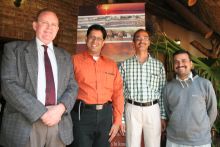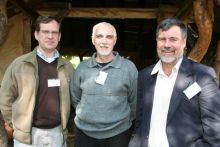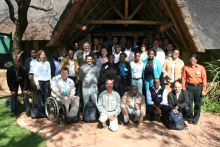A three-way affair
|
A group of passionate environmental scientists from the world’s three fastest economically emerging countries – South Africa, Brazil and India – met in May this year at a workshop in Pretoria to discuss how to implement the concept of a trilateral Sub-Global Assessment (SGA). The workshop took place under the auspices of South Africa’s Department of Science and Technology.
Having provided a platform for canvassing support for the idea of a trilateral SGA among stakeholders, SAEON took the initiative to market the idea to potential collaborators in Brazil and India. SAEON moreover coordinated the process of getting the country proposals submitted to and accepted by the SGA Secretariat.
The main aims of the workshop were to come up with a scientific framework for integrating the three individual country proposals into one trilateral SGA proposal; develop an action plan for the trilateral sub-global assessment (inclusive of a strategy for raising funds for the project); and establishing a trilateral SGA coordination forum.
Millennium Ecosystem Assessment
Between 2000 and 2005, a grand exercise of synthesising and evaluating complex information on ecosystems services took place in various parts of the world. Dubbed the Millennium Ecosystem Assessment (MA), this global programme was aimed at assessing the consequences of ecosystem change on human well-being, and establishing the scientific justification for the conservation and sustainable utilisation of the world’s ecosystems.
The MA was conducted as a multi-scale assessment, with a number of components undertaken at local, basin, national and regional scales. These were in addition to the global assessment. South African scientists played a key role in the southern African Millennium Ecosystem Assessment (SAfMA) component of the global programme.
Assessments at sub-global levels
In 2008, the MA Secretariat launched an MA follow-up programme with a focus on assessments at sub-global levels. South African leading scientists seized the opportunity to engage in the follow-up sub-global assessment (SGA), and embarked on a process to prepare a proposal to carry out an SGA project covering both terrestrial and marine ecosystems. The latter did not feature prominently in the SAfMA, and yet it is crucial to the livelihoods of a significant proportion of the population in southern Africa, as well as to the regulation of the climatic patterns of the region.
The scientists also contemplated on enriching the SGA process by making it a comparative one across continents. That is when the three-country (South Africa, Brazil and India) design to test an emerging idea for structuring sub-global assessments in a less arbitrary way emerged.
Many aspects of the Indian, Brazilian and South African physical and developmental environments are shared. Therefore, a comparative assessment on a commonly agreed set of issues, using a consistent methodology should therefore allow for generalisations to be made about the consequences of ecosystem change for human well-being in the context of rapid industrialisation in the three countries.
The SGA workshop resulted in a strong basis for future discussion. Delegates resolved to meet again in Brazil next year at a forum similar to the one held in South Africa to continue the discussions and comparative studies between the three countries.













